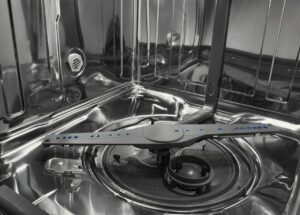Choosing Between a Plastic and a Stainless Steel Dishwasher Tub

The choice between a plastic and a stainless steel dishwasher tub represents a crucial decision in the realm of kitchen appliances, with each material offering distinct advantages and considerations. The dishwasher tub serves as the interior cavity where the cleaning magic happens, and the material chosen significantly influences performance, durability, and maintenance. The debate between plastic and stainless steel tubs reflects the evolving preferences of consumers who seek both efficiency and longevity in their kitchen investments. Plastic tubs, known for their affordability and resistance to rust, have long been a popular choice. On the other hand, stainless steel tubs have gained prominence for their durability, heat retention, and sleek aesthetic. As homeowners navigate this decision-making process, they weigh factors such as budget, cleaning capabilities, and the desire for a robust, long-lasting appliance.
Durability and Longevity
One of the primary considerations when choosing between a plastic and a stainless steel dishwasher tub is the durability and longevity of the material. Stainless steel tubs are renowned for their robust construction, resistant to cracks, chips, and stains over time. They are less susceptible to wear and tear, making them an ideal choice for households with heavy usage. On the other hand, plastic tubs, while generally durable, may be more prone to scratches and wear, potentially affecting their lifespan. Consider the longevity of the dishwasher, and if investing in a durable, long-lasting appliance is a priority, a stainless steel tub might be the preferred choice for enduring performance.
Heat Retention and Efficiency
Stainless steel boasts superior heat retention compared to plastic, contributing to more efficient drying and cleaning processes in a dishwasher. The material’s ability to retain heat ensures that dishes dry faster and more thoroughly, reducing the need for additional drying time or energy consumption. In contrast, plastic tubs may not retain heat as effectively, potentially leading to longer drying cycles and increased energy usage. For those focused on energy efficiency and quicker dishwashing results, a stainless steel tub presents a compelling choice, aligning with modern kitchen trends that prioritize both performance and sustainability.
Noise Reduction
The material of the dishwasher tub can influence the noise levels during operation. Stainless steel tubs, with their dense and sturdy construction, tend to dampen sound better than plastic alternatives. The sound insulation properties of stainless steel contribute to a quieter and more pleasant kitchen environment, especially during nighttime or open-concept living situations. Plastic tubs, while still capable of providing satisfactory noise reduction, may transmit more operational noise compared to their stainless steel counterparts. If a quiet kitchen ambiance is a priority, opting for a dishwasher with a stainless steel tub can enhance the overall user experience.
Maintenance and Cleaning
Maintenance and cleaning considerations play a pivotal role in the decision-making process. Stainless steel tubs are generally easier to clean and maintain due to their smooth, non-porous surface, which resists stains and odors. Additionally, stainless steel is less prone to discoloration over time. Plastic tubs, while durable, may require more effort to prevent staining and odors. They can be susceptible to discoloration, particularly when exposed to high-temperature wash cycles. Homeowners who prioritize easy maintenance and a dishwasher that maintains its aesthetic appeal over time may find the stainless steel tub to be a more suitable choice.
Affordability
Budget considerations often influence appliance decisions, and the cost difference between plastic and stainless steel dishwasher tubs is a crucial factor. Plastic tubs are generally more affordable, making them an attractive option for those seeking a cost-effective dishwasher solution. Stainless steel tubs, while offering numerous advantages, come with a higher price tag. Homeowners must weigh the long-term benefits of a stainless steel tub against their budget constraints. If initial cost is a primary concern, a dishwasher with a plastic tub may offer a satisfactory compromise, providing efficient cleaning without exceeding budgetary limits.
Aesthetic Appeal
The aesthetic appeal of the dishwasher is a subjective but significant factor in the decision-making process. Stainless steel tubs contribute to a sleek and modern appearance, aligning with contemporary kitchen designs. The reflective surface of stainless steel adds a touch of sophistication and seamlessly integrates with other stainless steel appliances. Plastic tubs, while functional, may lack the upscale aesthetic that many homeowners desire. Consider the overall design and style of the kitchen when choosing between a plastic and a stainless steel tub, ensuring that the selected dishwasher enhances the visual harmony of the space.
Environmental Impact
The environmental impact of the chosen dishwasher tub material is an increasingly important consideration in today’s eco-conscious society. Stainless steel is a recyclable material, and its longevity and durability contribute to a reduced need for replacement and disposal. While plastic tubs are also recyclable, their lifespan may be shorter, leading to a potentially higher frequency of replacements. Additionally, the production and disposal of plastic can have environmental implications. For those prioritizing sustainability, the recyclability and longevity of stainless steel may make it a more environmentally friendly choice in the long run.
Weight and Installation
The weight of the dishwasher, influenced by the tub material, can impact the installation process and overall kitchen design. Stainless steel is a denser material than plastic, and as a result, appliances with stainless steel tubs may be heavier. While this weight contributes to the sturdiness of the dishwasher, it’s essential to consider the load-bearing capacity of kitchen cabinets and the ease of installation. Plastic tubs are generally lighter, making them easier to handle during installation. Homeowners with specific installation requirements or limitations may find that the weight of the dishwasher, influenced by the tub material, plays a role in their decision-making process. Consideration of weight is crucial for ensuring a seamless and secure installation that aligns with the structural capabilities of the kitchen space.
Choosing between a plastic and a stainless steel dishwasher tub involves a careful consideration of factors such as durability, heat retention, noise reduction, maintenance, affordability, aesthetic appeal, and environmental impact. By weighing these aspects based on individual preferences, lifestyle, and kitchen priorities, homeowners can make an informed decision that aligns with their needs and enhances the efficiency and style of their kitchen space.
If you want to get access to the latest dishwasher features and take a look at our extensive range of up-to-date appliances, or speak to one of our home appliance experts for additional help, we are here.
- How to Design a Year-Round Outdoor Kitchen in Southern California
- What Are Flush-Mount Appliances: Flush-Mount Appliances Explained
- What Appliance Brands Hold Their Value the Longest
- Designing the Ultimate Outdoor Bar: Must-Have Appliances for Year-Round Fun
- Luxury Refrigerator Guide 2025: Built-In vs. Freestanding and What to Know Before You Buy
- How Smart Appliances Are Changing Luxury Kitchen Design in 2025
- The Ultimate Outdoor Grill Guide for 2025: Built-In vs. Freestanding
- Smart Bathroom Faucets & Fixtures in 2025: Blending Technology with Luxury Design
- Built-In Coffee Machines: Are They Worth It for Your Kitchen in 2025?
- How to Choose the Right Dishwasher for Your Home: Noise, Capacity, and Features Explained






